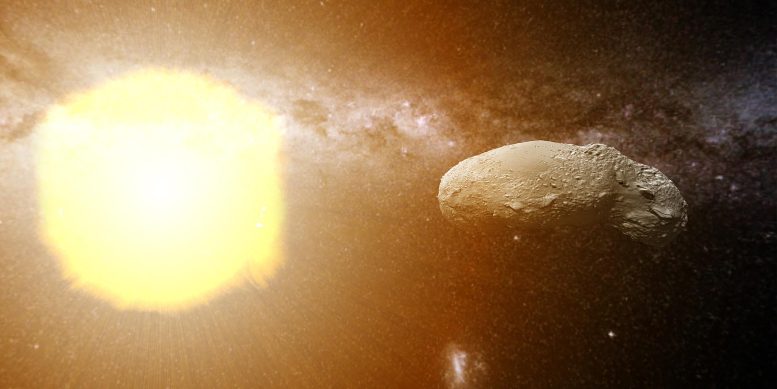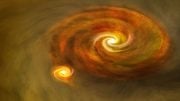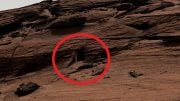Curtin University researchers have helped unravel the enduring mystery of the origins of the Earth’s water, finding the Sun to be a surprising likely source.
A University of Glasgow-led international team of researchers including those from Curtin’s Space Science and Technology Centre (SSTC) found the solar wind, comprised of charged particles from the Sun largely made of hydrogen ions, created water on the surface of dust grains carried on asteroids that smashed into the Earth during the early days of the Solar System.
SSTC Director, John Curtin Distinguished Professor Phil Bland said the Earth was very water-rich compared to other rocky planets in the Solar System, with oceans covering more than 70 percent of its surface, and scientists had long puzzled over the exact source of it all.
“An existing theory is that water was carried to Earth in the final stages of its formation on C-type asteroids, however, previous testing of the isotopic ‘fingerprint’ of these asteroids found they, on average, didn’t match with the water found on Earth meaning there was at least one other unaccounted for source,” Professor Bland said.
“Our research suggests the solar wind created water on the surface of tiny dust grains and this isotopically lighter water likely provided the remainder of the Earth’s water.
“This new solar wind theory is based on meticulous atom-by-atom analysis of minuscule fragments of an S-type near-Earth asteroid known as Itokawa, samples of which were collected by the Japanese space probe Hayabusa and returned to Earth in 2010.
“Our world-class atom probe tomography system here at Curtin University allowed us to take an incredibly detailed look inside the first 50 nanometers or so of the surface of Itokawa dust grains, which we found contained enough water that, if scaled up, would amount to about 20 liters for every cubic meter of rock.”
Curtin graduate Dr. Luke Daly, now of the University of Glasgow, said the research not only gives scientists a remarkable insight into the past source of Earth’s water, but could also help future space missions.
“How astronauts would get sufficient water, without carrying supplies, is one of the barriers of future space exploration,” Dr. Daly said.
“Our research shows that the same space weathering process which created water on Itokawa likely occurred on other airless planets, meaning astronauts may be able to process fresh supplies of water straight from the dust on a planet’s surface, such as the Moon.”
Reference: “Solar wind contributions to Earth’s oceans” by Luke Daly, Martin R. Lee, Lydia J. Hallis, Hope A. Ishii, John P. Bradley, Phillip. A. Bland, David W. Saxey, Denis Fougerouse, William D. A. Rickard, Lucy V. Forman, Nicholas E. Timms, Fred Jourdan, Steven M. Reddy, Tobias Salge, Zakaria Quadir, Evangelos Christou, Morgan A. Cox, Jeffrey A. Aguiar, Khalid Hattar, Anthony Monterrosa, Lindsay P. Keller, Roy Christoffersen, Catherine A. Dukes, Mark J. Loeffler and Michelle S. Thompson, 29 November 2021, Nature Astronomy.
DOI: 10.1038/s41550-021-01487-w
The research was supported by funding from the Science and Technologies Facilities Council (part of UKRI), and conducted by researchers from the University of Glasgow, Curtin University, the University of Sydney, the University of Oxford, the University of Hawai‘i at Mānoa, the Natural History Museum, Idaho National Laboratory, Lockheed Martin, Sandia National Laboratories, NASA Johnson Space Center, the University of Virginia, Northern Arizona University and Purdue University.
Other Curtin authors were Dr. David Saxey, Dr. Denis Fougerouse, Dr. William Rickard, Dr. Lucy Forman, Associate Professor Nick Timms, Professor Fred Jourdan, Professor Steven Reddy, Dr. Zakaria Quadir, and Morgan Cox.










Atheistism…answers all the world’s unknowns. Like Play Doh it’s whatever you need it to be. It’s a Safe Space. Or is it.
The science is the same for superstitious, only that such scientists have to leave that outside the laboratory – check their peer reviewed published papers. Luckily science is far from answering all questions (or it would have stopped).
But as for people being safe from various superstitions, that is a solid fact. In the last decades cosmologists have been able to observe and model 100 % of the universe – all there is – with the LCDM model. And guess what: there were no magic.
Unfortunately we are not “safe” from superstitious trolling irrelevancies and absurdities.
Our big beautiful ball of hydrogen is our best friend.
By coincidence the Egyptians guessed right… The Egyptians believed that Ra made two trips to the water daily by boat, going past the horizon line.
Another example of irrelevant superstition being wrong.
The sources of earth’s water can have been many.
“It was long thought that Earth’s water did not originate from the planet’s region of the protoplanetary disk. Instead, it was hypothesized water and other volatiles must have been delivered to Earth from the outer Solar System later in its history. Recent research, however, indicates that hydrogen inside the Earth played a role in the formation of the ocean.[3] The two ideas are not mutually exclusive, as there is also evidence that water was delivered to Earth by impacts from icy planetesimals similar in composition to asteroids in the outer edges of the asteroid belt.” [ https://en.wikipedia.org/wiki/Origin_of_water_on_Earth ]
The found ratio is 0.2 % water by volume, while Earth’s water is 1/10 of that [see the link]. But any of the mixings giving the observed isotope ratios are possible.
It is mentioned in Taittriya upanishad of Vedas (Hindu)that water came from combining of fire(oxygen) in the planets (in the origin)with sun(hydrogen fusion energy).Sounds good. Ethiraj